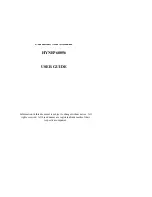
What to do if interference occurs
Warning: Changes or modifications to this unit not expressly approved by the party
responsible for compliance could void the user's authority to operate the equipment.
This equipment has been tested and found to comply with the limits for a Class B digital
device, pursuant to part 15 of Subpart B of the FCC Rules. These limits provide reasonable
protection against harmful interference in a residential installation. This equipment
generates, uses, and can radiate radio frequency energy and, if not installed and used in
accordance with the instructions, may cause harmful interference to radio communications.
Operation of this equipment in a residential area is likely to cause harmful interference, in
which case the user will be required to correct the interference at his own expense.
There is no guarantee that interference will not occur in a particular installation.
If this equipment does cause harmful interference to radio or television reception, which
can be determined by turning the equipment off and on, the user is encouraged to try to
correct the interference by one or more of the following
measures:
RE-orient or relocate the receiving antenna.
Increase the separation between the equipment and receiver.
Relocate the CardBus 56k Modem away from the receiving antenna and / or
equipment.
Plug the CardBus 56k modem into a different outlet so that the CardBus 56k
Modem and the receiving equipment are on different electrical circuits.
If none of these actions resolve the problem, consult your distributor or an experienced
radio / television technician for additional suggestions.
Repeat Calling
The host computer software must not initiate repeat call attempts within intervals shorter
than thirty (30) seconds. The user should ensure that the software is set correctly.




























